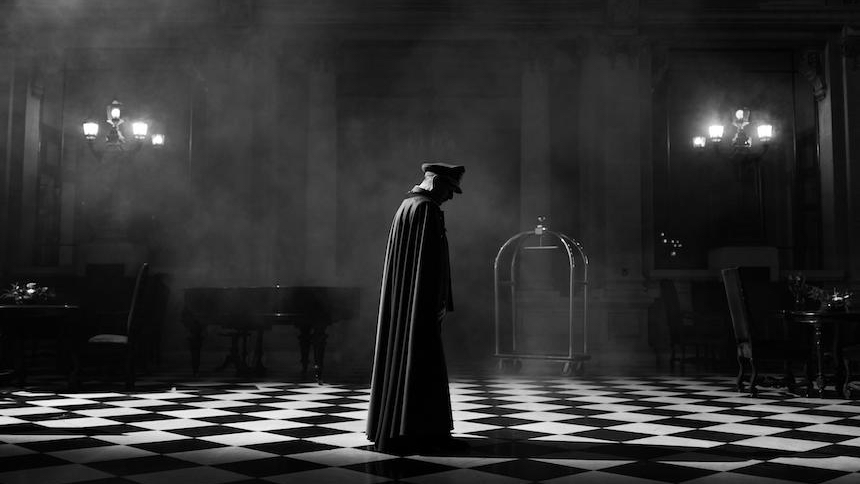EL CONDE Review: Pablo Larraín's Anti-Pinochet Satire Soars On Its Vampiric Metaphor

For Chileans, September 11th has an entirely different meaning than it does for Americans.
For the latter, September 11th refers to the 2001 terrorist attacks on the World Trade Center and the Pentagon and the nearly 3,000 lives lost. For the former, September 11th refers to the date in 1973 when Augusto Pinochet, a CIA-backed army general and chief-of-staff, overthrew the rightfully, democratically elected president of Chile, Salvador Allende, in a military coup.
Pinochet and his supporters instituted a reign of terror, suppression, and repression that lasted almost two decades. “The disappeared,” as political dissidents and opponents of the Pinochet regime who vanished permanently into internment camps were called, numbered approximately three thousand. Left-leaning liberals, academics, and government workers who didn’t go into exile lived to see a hard-fought, peaceful transition in 1990.
Never brought to justice in Chile or before the International Criminal Court in the Hague, Pinochet died peacefully in 2006 at the age of 90. In writer-director Pablo Larraín’s (Spencer, Ema, Jackie) latest, the sometimes brilliant, sometimes bold, sometimes frustrating political satire, El Conde (“The Count”), however, Pinochet never died. Instead, the near-immortal vampire went into self-exile somewhere near the southern tip of Chile.
The physical, metaphorical, and metaphysical embodiment of fascism as a parasitic, undead ideology, Larraín’s Pinochet (Jaime Vadell), putters around his compound, seemingly eager for the oblivion that death will bring, yet ever fretting over what he considers unjust attacks on his reputation – in his twisted worldview, he “saved” Chile from the evils of communism – and, in a more literal sense, the inheritance he’ll bequeath to his adult children, each one more venal, dim-witted, and/or greedy than the next.
With only his longtime personal valet, Fyodor (Alfredo Castro), an over-zealous White Russian, anti-communist ideologue, and chief torturer, and his bored, indifferent wife, Lucía Hiriart (Gloria Münchmeyer), as erstwhile companions, Pinochet makes end-of-afterlife plans. With his papers – and more specifically, his various ill-gotten, illegal off-shore accounts – in complete disarray, however, Pinochet turns to the Catholic Church, the historical ally of fascist dictatorships over the last century, for assistance with his financial issues.
The Church sends Carmen (Paula Luchsinger), a nun-accountant, ostensibly to help Pinochet and his family. Like everyone in and around Pinochet, including the former dictator, himself, Carmen has an agenda of her own that both intersects and conflicts with the undead vampire’s plans.
Larraín and his co-screenwriter, Guillermo Calderón, interweave a recurring, offscreen narrator’s commentary into the narrative mix. The British-accented narrator not only comments on the proceedings, giving context here, exposition there, but also shares her caustic, acidic opinions with the audience about the other characters, up to and including Carmen, whose apparent innocence the narrator dismisses with a mix of envy and contempt, mostly because she can’t be there in person to manipulate or direct the characters to her own desired ends.
In a brilliant, potentially divisive decision, Larraín and Calderón cheekily reveal the narrator’s identity in the third act, expanding their satirical aim outside Chile’s borders to a Western European country with an imperialist history of its own.
Larraín and Calderón certainly had plenty to satirize here, from the fascist military dictatorship itself to the Catholic Church’s complicity, and external interference from so-called Western democracies. In an extended, arguably overlong second act, Carmen interviews the surviving members of the Pinochet household, including Pinochet himself, ostensibly about their finances.
Each, in turn, readily admits to multiple crimes, justifying them as inadvertent, opportune, or even necessary, but almost always acknowledging them directly. Carmen often cloaks her queries and accusations with religious language, making it all the easier for the respondents to nod in agreement or answer affirmatively.
As an idea or metaphor, vampirism in fiction and on film has proven itself almost infinitely malleable. Over time, vampirism has come to reflect everything from disease and infection to perverted, illicit desire and romantic or substance-based addiction. Here, Larraín and Calderón use the literalized idea of vampirism to reflect their interpretation of fascism as parasitic on social, political, and economic structures and a toxic, viral ideology, lingering at a cellular level, ready to break through a weakened immune system at the first opportunity.
That, in turn, helps to explain why El Conde concludes not with a cathartic series or turn of events, but the exact opposite, as a bitter cautionary tale for everyone on the other side of the screen. Unattended and ignored, the undead spectre of fascism will return, taking power through whatever means are necessary or available.
El Conde begins streaming Friday, September 15, 2023, on Netflix.
El Conde
Director(s)
- Pablo Larraín
Writer(s)
- Guillermo Calderón
- Pablo Larraín
Cast
- Alfredo Castro
- Catalina Guerra
- Paula Luchsinger







